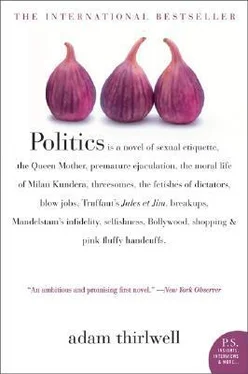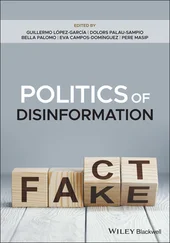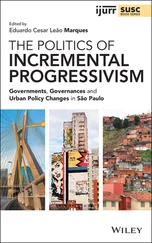Adam Thirlwell - Politics
Здесь есть возможность читать онлайн «Adam Thirlwell - Politics» весь текст электронной книги совершенно бесплатно (целиком полную версию без сокращений). В некоторых случаях можно слушать аудио, скачать через торрент в формате fb2 и присутствует краткое содержание. Год выпуска: 2004, Издательство: Harper Perennial, Жанр: Современная проза, на английском языке. Описание произведения, (предисловие) а так же отзывы посетителей доступны на портале библиотеки ЛибКат.
- Название:Politics
- Автор:
- Издательство:Harper Perennial
- Жанр:
- Год:2004
- ISBN:нет данных
- Рейтинг книги:3 / 5. Голосов: 1
-
Избранное:Добавить в избранное
- Отзывы:
-
Ваша оценка:
- 60
- 1
- 2
- 3
- 4
- 5
Politics: краткое содержание, описание и аннотация
Предлагаем к чтению аннотацию, описание, краткое содержание или предисловие (зависит от того, что написал сам автор книги «Politics»). Если вы не нашли необходимую информацию о книге — напишите в комментариях, мы постараемся отыскать её.
Moshe loves Nana. But love can be difficult — especially if you want to be kind. And Moshe and Nana want to be kind to someone else.
They want to be kind to their best friend, Anjali.
Politics
Politics — читать онлайн бесплатно полную книгу (весь текст) целиком
Ниже представлен текст книги, разбитый по страницам. Система сохранения места последней прочитанной страницы, позволяет с удобством читать онлайн бесплатно книгу «Politics», без необходимости каждый раз заново искать на чём Вы остановились. Поставьте закладку, и сможете в любой момент перейти на страницу, на которой закончили чтение.
Интервал:
Закладка:
The purpose: to save myself from persecution, poverty and, ultimately, inevitable death.
I did not heed this advice.
My purpose is far more serious.
I can prove with documentary evidence in my possession that the entire press of the USSR has been asserting WITH EXCEPTIONAL VIRULENCE, ever since I started to write, that the works of Mikhail Bulgakov cannot exist in the USSR.
I wish to state that the Soviet Press is QUITE RIGHT.
ANY SATIRIST IN THE USSR MUST QUESTION THE SOVIET SYSTEM.
Am I conceivable in the Soviet system?
I AM REQUESTING THE GOVERNMENT OF THE USSR TO ORDER ME TO LEAVE THE COUNTRY IN THE SHORTEST POSSIBLE TIME, ACCOMPANIED BY MY WIFE.
If, nevertheless, that which I have written proves unconvincing and I am doomed to a lifetime’s silence in the USSR, then I request the Soviet government to give me a job.
13
But, you say, that is entirely different. Bulgakov was living in Stalinist Russia. What is the connection between the pathos and courage of Bulgakov’s letter, and the relationship of Nana and Moshe? Surely I am not saying that the relationship of Nana and Moshe and Anjali was equivalent to living under Stalinism? A flirtatious threesome is not Stalinist.
Well no. It is not Stalinist. If Stalinist only means totalitarian aggression, then it was not Stalinist. But in 1930, Stalin was not Stalinist. Stalin was rather friendly. According to an informer for the secret police, Stalin phoned Mikhail Bulgakov up.
‘Are you comrade Bulgakov?’ said an apparatchik. ‘Yes,’ said Mikhail. ‘Comrade Stalin will now speak to you,’ said the apparatchik.
Bulgakov was convinced that this was a hoax but he waited all the same. He looked at the sleeve of his brown velveteen cardigan. There was a grease stain with a piece of onion sticking to it. He tried to flick the piece of onion off. It stuck there. He peeled it off.
Two to three minutes later Mikhail heard a voice over the telephone. It was Stalin’s voice. ‘I’m very sorry, Comrade Bulgakov, that I was not able to reply quickly to your letter but I was very busy. I was very interested by your letter. I would like to have a talk with you. I don’t know when it will be possible since, as I said, I am extremely occupied. But I shall let you know when I can see you. In any case, we shall try to do something for you.’
That was Stalin.
The informer for the secret police thought that this was a brilliant PR job by Stalin. According to this secret policeman — let’s call him Igor — according to Igor, everyone was saying: ‘Stalin really is an outstanding man and, just imagine, he’s also simple and accessible!’ Igor reported how Stalin’s popularity had developed in an extraordinary form. He was spoken of, said Igor, with warmth and affection, and the legendary story of Bulgakov’s letter was being retold in various forms. It was being told in every pub.
After this telephone call, Bulgakov was given a job at the Moscow Arts Theatre. And he never published again. But he had complained. He had resisted. He had just been stymied by Stalin’s phone manner.
I think the two situations, of Bulgakov and Stalin, and Moshe and Nana and Anjali, are very similar. This might seem unlikely at first, but it’s true. In case you had not noticed, in this book I am not interested in anything so small as the history of the USSR. I am not writing anything so limited. No, what I am interested in is friendliness. So I can see that if Stalinism means only totalitarian aggression, then describing Nana and Anjali and Moshe as Stalinist might seem borderline hysterical. But if Stalinism means politeness, then there is an obvious similarity. Let us call this type of Stalinism ‘telephone Stalinism’.
Telephone Stalinism is the use of friendliness as a coercive technique. It enforces compromise.
Everyone, sometimes, is a telephone Stalinist.
In terms of friendliness, I cannot see a difference between the individual behaviour of Nana and Mikhail Bulgakov and Moshe and Anjali and Stalin.
14
Anjali walked into Moshe’s living room. Nana was wrapped in a duvet on the futon. She was having a day off. She was watching Trisha. She was watching Trisha by looking up at the ceiling. This was because she was thinking about the issues raised by the strap line: My Boyfriend Told Me To Become An Erotic Dancer And Now He Wants Me To Stop. Nana did not think erotic dancing was erotic. When Gabrielle, who had long blonde hair and short fat legs and a purple diamante G-string and bra, rotated in the lap of an applauding male in the audience, Nana looked away. It was more sad than erotic. She looked up at the ceiling. The light was a softer version of blue. She wondered why pale white wasn’t paler than pale blue. She wondered why it was the same degree of paleness. That was how interested she was in the emotional fallout from erotic dancing.
Anjali sat snuggled on the futon beside her. She sat down and watched Trisha. Anjali liked the erotic dancer. She thought she seemed quirky. It was the boyfriend she disliked. She disliked his toupee.
‘Oh, my God!’ said Nana, staccato.
It was true. It was a toupee. The boyfriend was horrible. Nana agreed.
15
Anjali’s attitude to this happy trio — that was not yet a threesome, not yet — was ambivalent. Mostly, she was sad. For Anjali, only a couple was love. The third person was always an extra. On the other hand, she did enjoy being the extra to a couple. It had its luxurious side.
Anjali mused on couples while she acted in an advert for Johnson’s Baby Powder. Anjali was the straight girl to Anne Robinson. This advert was being made just as Anne’s career was taking off. So now, when Anne made an advert, the advert followed the format of The Weakest Link. That was how successful she was. This advert for Johnson’s Baby Powder was a spoof production of The Weakest Link for babies. There were four babies on blue plastic high chairs. Anne Robinson questioned them on the comfort and convenience of Johnson’s Baby Powder. Anjali was the voiceover for one of the babies. She voiced its gurgled thoughts. The Anjali baby was the last baby left. She was the Strongest Link. This was because the Anjali baby preferred Johnson’s Baby Powder to all other baby powders.
Oh in the end, thought Anjali, Anjali wanted to be in a couple. She wanted people to write anniversary cards to Anjali and. Anjali and Anouska. Anjali and Zebedee. It wasn’t the name that mattered. She would give barbecues, thought Anjali. Barbecues, it seemed, were Anjali’s ambition.
There was an explanation for this. Anjali was feeling upset about couples because of her ex-girlfriend, Zosia. Anjali had discovered, a week ago, that Zosia had recently married her girlfriend of three months, in a tender and moving ceremony on a Costa Rican beach. They were married in a makeshift hut made of yam wood.
Oh, Anjali. Look what Zosia has done to you. She has made you love the idea of barbecues. Your ex gets married in Costa Rica and you want to be a wife.
Whereas when Anjali was young, she had detested the idea of a couple. It was her mother who liked couples. Her mother had been very pro couples. She had been very pro marriage. Because of this bias, Anjali’s mother had not always enjoyed their weekly family trip to the Belle Vue cinema in Edgware. These trips were not always pleasurable. They did not always end on a finale of heterosexual marriage. Sometimes the films seemed to see love as tragic. They made love grandiose and destructive.
This was still a difference between Anjali and her mother. They still did not enjoy the same films. For example, Anjali’s favourite Bollywood film was a recent film called Devdas. Devdas is the most expensive Bollywood film ever made. After an improbable plot, the hero dies, outside the gates of his first, only and unrequited love, played by the former Miss World, Aishwarya Rai.
Читать дальшеИнтервал:
Закладка:
Похожие книги на «Politics»
Представляем Вашему вниманию похожие книги на «Politics» списком для выбора. Мы отобрали схожую по названию и смыслу литературу в надежде предоставить читателям больше вариантов отыскать новые, интересные, ещё непрочитанные произведения.
Обсуждение, отзывы о книге «Politics» и просто собственные мнения читателей. Оставьте ваши комментарии, напишите, что Вы думаете о произведении, его смысле или главных героях. Укажите что конкретно понравилось, а что нет, и почему Вы так считаете.












